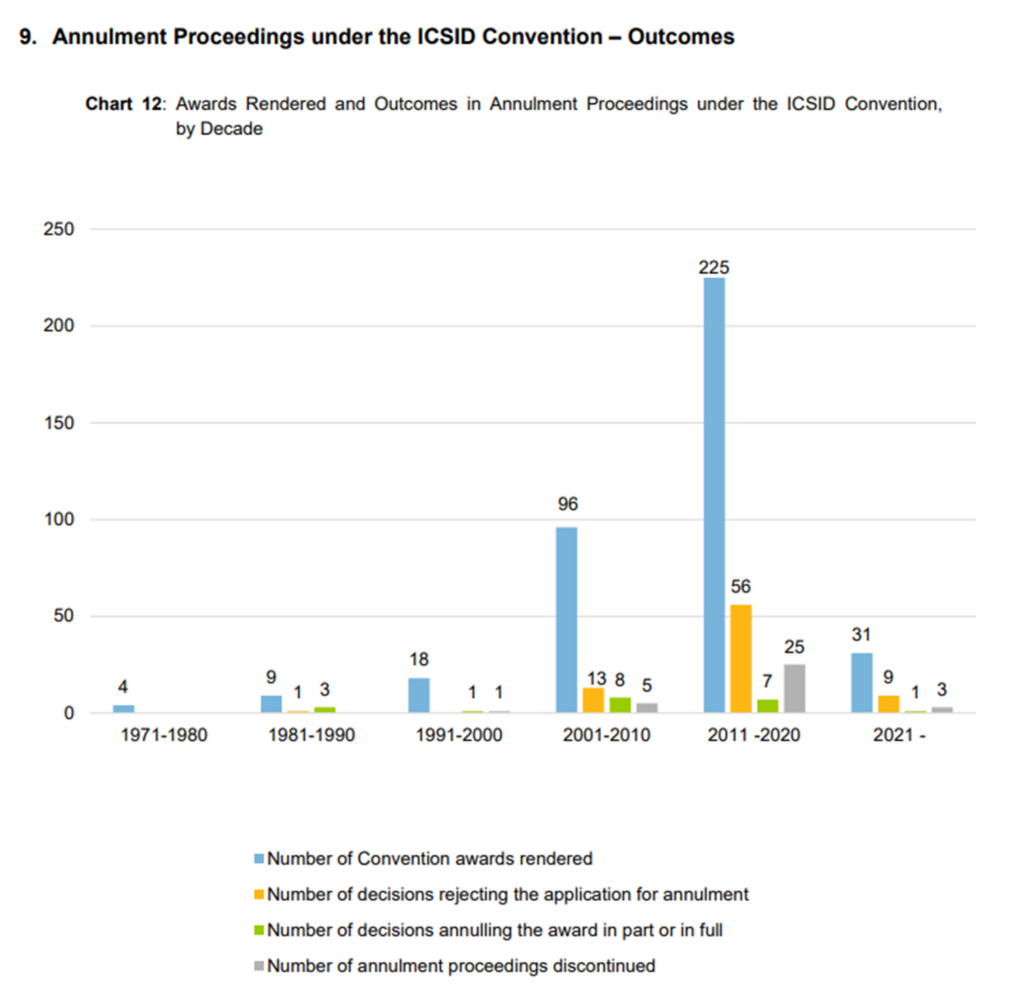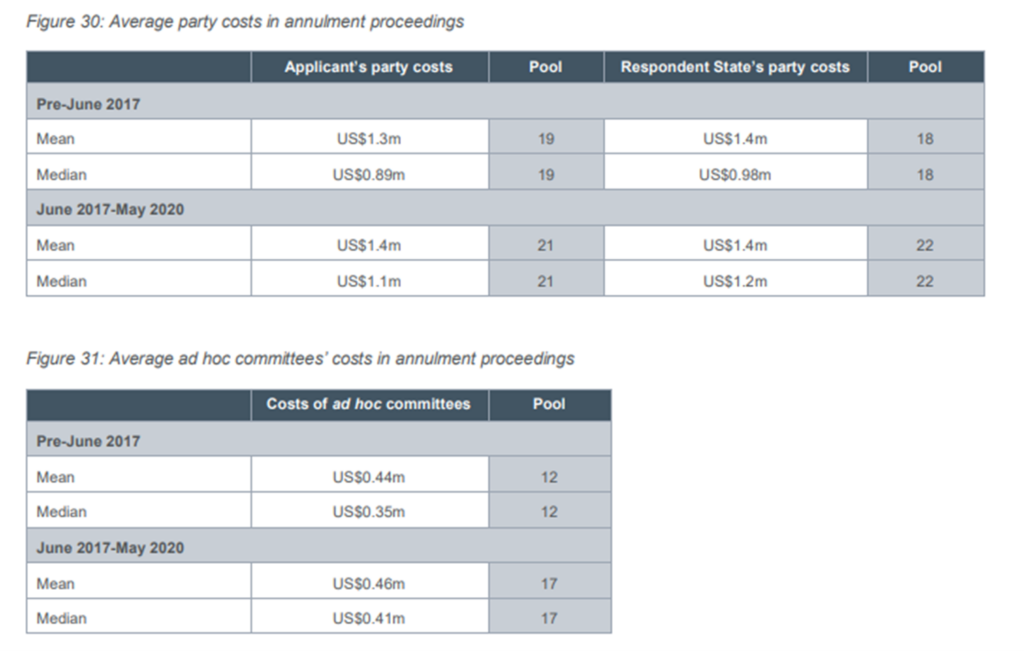Pursuant to Article 53 of the ICSID Convention, ICSID awards are binding on the parties and “shall not be subject to any appeal or any other remedy except those provided for in this Convention”. As correctly stated by the ad hoc committee in the Standard Chartered Bank v. Tanzania Electric Supply Company case, this “Article reflects an important access of the ICSID system, namely, its self-contained nature, since national courts have no role in the ICSID proceedings.”[1] The ICSID Convention provides, however, for several post-award remedies[2] amongst which figure annulment proceedings. Contrary to other post-award remedies, annulment proceedings are not held before the initial arbitral tribunal that rendered the final award, but before a new panel of three members called an ad hoc committee.
The framework for annulment proceedings is set out in Article 52 of the ICSID Convention, which contains an exhaustive and limitative list of grounds on which the annulment of an award might be sought by either Party:
- the Tribunal was not properly constituted;
- the Tribunal has manifestly exceeded its powers;
- there was corruption on the part of a member of the Tribunal;
- there has been a serious departure from a fundamental rule of procedure; and
- the award has failed to state the reasons on which it is based.
Since annulment proceedings are an exceptional remedy that is “intended to ensure the integrity of ICSID arbitration proceedings, not their substantive correctness”,[3] meaning that ad hoc committees do not act as appellate courts having powers to revisit the substance of the final award, the likelihood of success in having the final award annulled is limited. As shown in the statistics released by the ICSID in February 2022, between 2011-2020, a decade, only seven awards were totally or partially annulled:

In addition to the very low rate of success of annulment proceedings (over the same decade, 56 requests for annulment were rejected, meaning that annulment applications were eight times more likely to be rejected than to succeed), annulment proceedings have high costs.
Costs of ICSID Annulment Proceedings
As for the initial arbitration proceedings,[4] several costs are incurred by the parties in annulment proceedings. First, the applicant needs to proceed to payment of a non-refundable lodging fee of USD 25,000. Second, contrary to the regime of advance on costs in initial proceedings where the parties are asked to pay advance(s) on costs on an equal basis, Administrative and Financial Regulation Rule 14(3)(e) stipulates that “the applicant shall be solely responsible for making the advance payments requested by the Secretary-General to cover expenses following the constitution of the Committee, and without prejudice to the right of the Committee in accordance with Article 52(4) of the Convention to decide how and by whom expenses incurred in connection with the annulment proceedings shall be paid.” Third, the parties will incur legal fees for their representation and corresponding expenses.
In a study published by the British Institute of International and Comparative Law and Allen & Overy in 2021, the overall costs of annulment proceedings in recent years were analysed. The study showed that the “mean costs of applicants for annulment increased by 29% and costs of respondent States to annulment application rose by almost a quarter”.[5] Regarding the costs of ad hoc committees, the study emphasized an increase of approximatively USD 20,000 since 2017.[6] Based on these figures, an average amount expected to be incurred for annulment proceedings by a party is between USD 1.1-1.4 million, along with the ad hoc committees’ costs of USD 410,000-460,000 to be paid by the party seeking annulment:

Allocation of Costs in Decisions on Annulment
According to Article 52(4) of the ICSID Convention, “The provisions of Articles 41-45, 48, 49, 53 and 54, and of Chapters VI and VII shall apply mutatis mutandis to proceedings before the Committee.” In turn, Article 61(2) of Chapter VI of the ICSID Convention provides that, unless otherwise agreed between the parties, the Tribunal “shall decide how and by whom those expenses, the fees and expenses of the members of the Tribunal and the charges for the use of the facilities of the Centre shall be paid. Such decision shall form part of the award.” In other terms, unless otherwise agreed between the parties, ad hoc committees dispose of discretion when allocating the costs in their decisions on annulment.
In practice, this discretion has been exercised in different manners. Although ad hoc committees may follow the principle of costs-follow-the-event, this approach is not uniform regarding the legal fees incurred by the successful party.
Certain ad hoc committees have considered that, in cases where the application for annulment was not frivolous, while the unsuccessful party shall bear the totality of the costs of annulment proceedings, the parties shall bear their own legal representation costs.[7] Other ad hoc committees have considered that the unsuccessful party shall bear both the entirety of the costs of annulment proceedings as well as the legal costs incurred by the other party, either in totality[8] or only their reasonable portion.[9]
Examples of Costs of Recent Annulment Proceedings
Case Example 1: Glencore International AG & CI Prodeco SA v. Republic of Colombia (ICSID Case No. ARB/16/6)
During the annulment proceedings, the parties incurred the following costs:
- Costs of the annulment proceedings amounting to USD 272,584.51.[10]
- Colombia’s legal representation costs and associated expenses amounting to USD 752,464.06.[11]
- Glencore’s and Prodeco’s legal representation costs and associated expenses amounting to USD 1,272,357.18.[12]
The ad hoc committee rejected the application for annulment. While allocating the costs, the ad hoc committee decided that Colombia “shall bear the entirety of” the costs of annulment proceedings.[13] Regarding the legal fees of the opposing party, the ad hoc committee held that it “can see no reason why Glencore and Prodeco should have incurred costs which were more than half as much again as those incurred by Colombia. In these circumstances, it considers that it is equitable to award Glencore and Prodeco a sum of USD 1,000,000.00 in respect of costs and expenses.”[14]
Case Example 2: Cube Infrastructure Fund SICAV and Others v. Kingdom of Spain (ICSID Case No. ARB/15/20)
During the annulment proceedings, the parties incurred the following costs:
- Costs of the annulment proceedings amounting to USD 481,080.90.[15]
- Spain’s legal representation costs and associated expenses amounting to EUR 1,135,517.05.[16]
- Cube’s and Demeter’s legal representation costs and associated expenses amounting to EUR 1,037,773.63.[17]
After rejecting the application for annulment, the ad hoc committee ordered Spain “to bear all costs of the proceeding, including the fees and expenses of the Committee, ICSID’s administrative fees and direct expenses in the amount of USD 481,080.90 and to cover Cube and Demeter’s legal fees and expenses in the amount of EUR 1,037,773.63.”[18]
Conclusion
Given the very low success of annulment proceedings and their increasing costs, parties potentially seeking an annulment of an ICSID award should consider all strengths and weaknesses of their application prior to charging forward. They should also bear in mind that, while they might recover the costs of annulment proceedings should their application be successful, it is the applicant alone who is required to pay the advance(s) on costs required for these proceedings. This renders annulment proceedings rather financially challenging, especially in cases where the chances of success are slim.
[1] Standard Chartered Bank v. Tanzania Electric Supply Company Limited, ICSID Case No. ARB/10/20, Decision on the Application for Annulment, 22 August 2018, para. 58.
[2] Other post-award remedies are (i) supplementary decision or rectification of the award (Article 49 of the ICSID Convention), (ii) interpretation of the award (Article 50 of the ICSID Convention), and (iii) revision of the award (Article 51 of the ICSID Convention).
[3] Vestey Group Ltd. v. Bolivarian Republic of Venezuela, ICSID Case No. ARB/06/14, Decision on Annulment, 26 April 2019, para. 56.
[4] See Advance on Costs in ICSID Arbitration, published by Aceris Law on 12 July 2019.
[5] “2021 Empirical Study: Costs, Damages and Duration of Investor-State Arbitration”, study published by BICL and Allen & Overy, June 2021, p. 24.
[6] “2021 Empirical Study: Costs, Damages and Duration of Investor-State Arbitration”, study published by BICL and Allen & Overy, June 2021, p. 24.
[7] Impregilo S.P.A. v. Argentine Republic, ICSID Case No. ARB/07/17, Decision of the Ad Hoc Committee on the Application for Annulment, 24 January 2014, para. 221.
[8] Alapli Elektrik B.V. v. Republic of Turkey, ICSID Case No. ARB/08/13, Decision on Annulment, 10 July 2014, para. 264.
[9] Glencore International AG & CI Prodeco SA v. Republic of Colombia, ICSID Case No. ARB/16/6, Decision on Annulment, 22 September 2021, para. 423.
[10] Glencore International AG & CI Prodeco SA v. Republic of Colombia, ICSID Case No. ARB/16/6, Decision on Annulment, 22 September 2021, para. 420.
[11] Glencore International AG & CI Prodeco SA v. Republic of Colombia, ICSID Case No. ARB/16/6, Decision on Annulment, 22 September 2021, para. 422.
[12] Glencore International AG & CI Prodeco SA v. Republic of Colombia, ICSID Case No. ARB/16/6, Decision on Annulment, 22 September 2021, para. 422.
[13] Glencore International AG & CI Prodeco SA v. Republic of Colombia, ICSID Case No. ARB/16/6, Decision on Annulment, 22 September 2021, para. 421.
[14] Glencore International AG & CI Prodeco SA v. Republic of Colombia, ICSID Case No. ARB/16/6, Decision on Annulment, 22 September 2021, para. 423.
[15] Cube Infrastructure Fund SICAV and Others v. Kingdom of Spain, ICSID Case No. ARB/15/20, Decision on Annulment, 28 March 2022, para. 501.
[16] Cube Infrastructure Fund SICAV and Others v. Kingdom of Spain, ICSID Case No. ARB/15/20, Decision on Annulment, 28 March 2022, para. 481.
[17] Cube Infrastructure Fund SICAV and Others v. Kingdom of Spain, ICSID Case No. ARB/15/20, Decision on Annulment, 28 March 2022, para. 488.
[18] Cube Infrastructure Fund SICAV and Others v. Kingdom of Spain, ICSID Case No. ARB/15/20, Decision on Annulment, 28 March 2022, para. 503.
